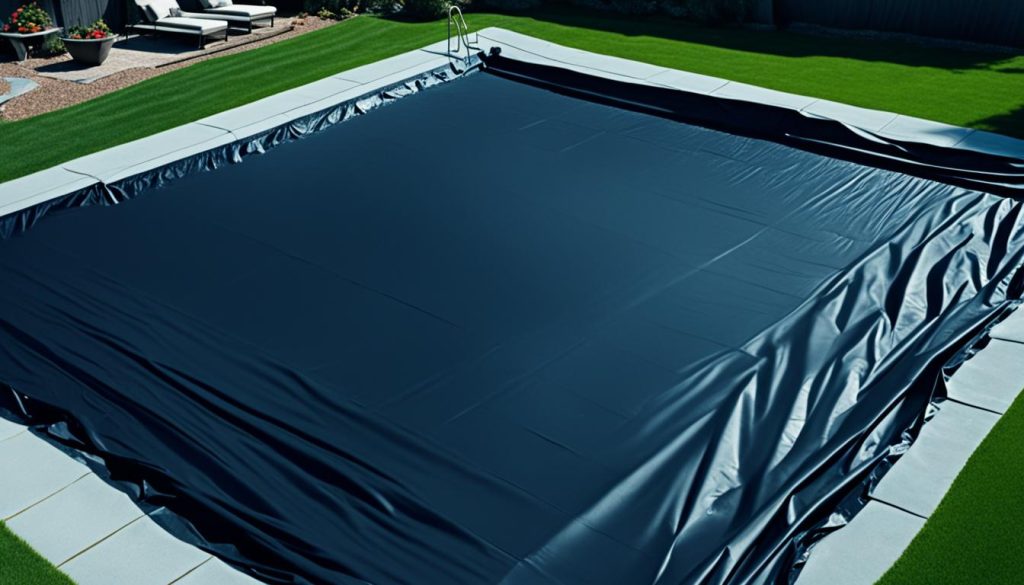As the quest for more cost-effective ways to keep swimming pools warm continues, many homeowners are turning to unconventional methods like pool heating with a black tarp. While a traditional blue pool cover is a common sight in many backyards, the question arises: does a black tarp raise pool temperature? This approach is gaining traction, with pool owners exploring the benefits of using a tarp to warm a swimming pool. Integrating these tips for using a black tarp to heat a pool could mean the difference between a brisk swim and a comfortably warm dip.
Key Takeaways
- Black tarps absorb sunlight, potentially raising the pool’s temperature.
- Securing the tarp snugly with bungee cords can enhance heat retention.
- Uncovering the pool during peak sunlight hours maximizes heat absorption.
- Covering the pool afterward minimizes heat loss, maintaining warmer water.
- Balancing heating benefits with the risk of damage to the pool’s components is important.
Understanding Pool Heating Dynamics
Delving into the mechanisms of pool temperature regulation, we uncover the roles and efficiency of various covering methods. Employing the right cover could be the key to a warmer and more enjoyable swimming experience while being friendly to your budget.
The Role of Solar Covers in Pool Temperature Regulation
Solar covers serve as an efficient way to harness the sun’s energy to naturally elevate the warmth of pool water. Utilizing its translucent material, solar covers allow sunlight to penetrate and heat the water directly. This not only translates to increased water temperatures but also minimizes evaporation—the primary cause of heat dissipation in pools. The explicit benefits of black tarp for heating pools may differ, yet the principle of using sunlight remains constant across various heating solutions.
Black Tarps vs. Traditional Pool Covers: A Comparative Analysis
When it comes to how to heat a pool with a black tarp, the material’s color plays a significant role. A black tarp, absorbing more solar radiation, can potentially elevate water temperature more effectively than traditional pool covers. However, unlike solar covers designed specifically for thermal retention, black tarps may lack certain features like air bubbles that add an insulating layer.
How Evaporation Affects Pool Temperature
Evaporation stands as the main antagonist in the narrative of pool heat preservation. The constant conversion of water to vapor leads to a significant drop in temperature. A black tarp as a pool heating solution addresses this concern to a degree, but not to the extent of specialized pool covers that are engineered to counter evaporation. Understanding this dynamic is pivotal for anyone considering a black tarp pool heater as part of their pool maintenance strategy.
In summary, the warmth retention of a swimming pool is contingent upon various factors, including the quality and type of cover used. As we venture into pioneering and budget-friendly solutions like black tarps, it remains essential to weigh their heating capabilities against their design limitations, thus informing an optimal choice for individual pool heating needs.
Will a Black Tarp Heat a Pool
As pool owners seek cost-effective solutions to enhance their swimming experience, the concept of using a tarp to warm a swimming pool has garnered attention. Specifically, a black tarp pool heater is discussed as a means to harness the sun’s natural energy. But the question arises, will a black tarp heat a pool effectively? This method involves laying a black tarp over the water’s surface, taking advantage of the tarp’s color to absorb and transfer heat to the cool waters below.
While not designed explicitly for pool heating, the black tarp’s material is adept at soaking up sunlight. The darker hue enhances its ability to attract more warmth from the sun compared to lighter-colored or transparent covers. On days where the sun is at its peak, the black tarp technique shows remarkable potential in elevating pool water temperature, offering a respite from the chill without electrical or gas heaters.
However, it’s crucial to understand that a black tarp, unlike specialized solar covers with air bubbles to maximize insulation, is a more rudimentary form of a pool heater. The lack of these thermal retention features means that, while the water may warm up under the blazing sun, it may not retain heat as long as a pool would with a purpose-designed solar cover.
Besides the heating aspect, there are practical concerns to consider such as the potential of causing damage to the pool’s plastic parts due to prolonged exposure to heat. One must carefully weigh the benefits of a slightly increased temperature against the longevity and maintenance of their swimming pool.
To better understand this dynamic, let’s consider the experiences of pool users who have experimented with this method:
Many pool owners have reported a notable difference in water temperature after deploying a black tarp over their pool; however, they also caution against leaving the tarp on for too long to avoid overheating and damage to the pool structure.

In summary, while a black tarp can indeed function as a makeshift pool heater by absorbing and transferring solar heat, its efficiency and safety depend largely on the user’s careful application and monitoring. Although it presents a simple and inexpensive heating alternative, it cannot entirely replace the benefits of a true solar cover designed specifically for pool temperature regulation.
Conclusion
In summary, the question “will a black tarp heat a pool?” can be answered affirmatively. The unique capacity of a black tarp to absorb solar heat has been noted as a definite advantage for pool owners seeking a cost-effective solution to pool heating. While conventional heating covers are designed specifically for this purpose, the benefits of black tarp for heating pools cannot be overlooked by those looking for an economical alternative. Its dark color naturally draws in sunlight and imparts warmth to the water below, effectively raising the temperature during sunlit hours.
However, it’s vital to mention that meticulous handling is paramount when using a black tarp to heat a pool. To reap the maximum benefits, pool owners should heed tips for using a black tarp to heat a pool, such as timely installation and removal to prevent excessive heat buildup and avoid damage to the pool’s material. It’s a balancing act between harnessing the sun’s energy effectively and preserving the integrity of your pool’s components. The black tarp technique stands as a resourceful method amidst a gamut of pool heating strategies, each with merits and considerations to bear in mind.
Ultimately, the inclusion of a black tarp as a method of pool temperature regulation should be considered an adjunct to a comprehensive pool management plan. Embracing diverse approaches in tandem with a black tarp, from solar blankets to strategic landscaping for wind protection, could synergistically contribute to an optimized swim experience. This pragmatic adaptation to pool heating underscores both ingenuity and a willingness to explore alternative techniques in maintaining a delightful swimming environment for friends and family.
